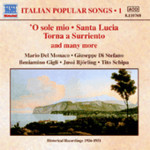
Italian Popular Songs 1
 $25.00
Out of Stock
$25.00
Out of Stock6+ weeks add to cart
ITALIAN POPULAR SONGS
Italian Popular Songs 1
Mario Del Monaco / Giuseppe Di Stefano / Beniamino Gigli / Jussi Bjorling / Tito Schipa
[ Naxos Historical / CD ]
Release Date: Thursday 1 May 2008
This item is currently out of stock. It may take 6 or more weeks to obtain from when you place your order as this is a specialist product.
The selections in the present CD programme are all survivors of bygone eras. They are good tunes and, having been variously recorded since the advent of the gramophone by famous singers (and by mainly tenors), all have acquired a certain permanence.
While to some it may mean only ice-cream or overweight tenors strutting their rather hackneyed stuff, as a genre 'Italian Song' boasts a healthy tradition extending back at least two centuries. In the global market it has always proved a steady seller and here, by definition, we mean Italian song in the broadest populist sense, with all its commercial overtones of sunshine and romance (the canzone popolare or napoletana which, however clichéd, continued to flourish until the arrival of Claudio Villa and the San Remo Festivals), as distinct from the aria antica of the seventeenth and eighteenth centuries, which, while also still favoured, has retained more serious, scholarly connotations (Bellini, Donizetti and Verdi later all wrote fine songs but these too are generic descendants of that earlier category).
The selections in the present CD programme are all survivors of bygone eras. They are good tunes and, having been variously recorded since the advent of the gramophone by famous singers (and more often than not, by tenors), all have acquired a certain permanence. And all are linked in tradition insofar as they presuppose reserves of the sustaining lyric tenor spirit and a certain italianità in performance. Some of the songs were already established favourites when recording first started and, among the oldest, Vieni sul mar (Come to the Sea) and La danza have remained to this day staples of the Italian tenor song repertoire. The first, dubbed an 'old Italian folk-song' and famously recorded by Caruso, has more far-flung global connections than may be realised. Ostensibly a late-eighteenth-century Venetian street-ballad, its tune was sung and whistled in pre-Revolutionary Russia as 'Poy, Lastotchka, Poy' (Sing, Swallow, Sing), while through the English music halls it was made even more famous in a famous Charles Coborn parody of 1886, entitled 'Two Lovely Black Eyes'. The second, the rafter-raiser of the Rossini song-cycle Soirées musicales (again notably recorded by Caruso) is a Neapolitan-style tarantella never outmoded since its first appearance in the early 1830s.
Chronologically next-in-line is Santa Lucia. Justly one of the most famous of Italian tunes, this hauntingly beautiful and simple ditty is generally - and incorrectly - regarded as a folk-song. Actually the work of one Teodoro Cottrau (1827-79) and published by its composer in 1849, in Naples, it appeared not long afterwards in an English translation in Baltimore and was thus among the first commercial Italian productions to reach a transatlantic audience. In fact, if not strictly speaking a blueprint, it was a foretaste of the melodia or canzone da camera soon afterwards in vogue in English-speaking countries, a salon-style miniaturising of the Italian operatic aria, the work of a number of Italian composers who by the mid-nineteenth century had settled in London, the earliest including the Neapolitan Michael (Michele) Costa (1806-1884) and the Tuscan Ciro Pinsuti (1829-1888). The latter, a one-time pupil of Rossini and a noted vocal coach, taught from 1856 at the London Royal Academy. His vast output included almost 250 songs akin to those of which Francesco Paolo Tosti (1946-1916) was to become the acknowledged master.
Tracks:
Francesco Paolo Tosti:
A vuchella
Tito Schipa, tenor
Anonymous:
L'alba separa dalla luce l'ombra
Jussi Bjorling, tenor
Michele Esposito:
Anema e core
Ferruccio Tagliavini, tenor
Alois Melichar:
Anima mia
Beniamino Gigli, tenor
Anima mia 00:03:21
Ernesto De Curtis:
Carmela
Beniamino Gigli, tenor
Anonymous:
Canta pe' me!
Beniamino Gigli, tenor
Richard Barthelemy:
Chi se nne scorda cchiu
Tito Schipa, tenor
Salvatore Cardillo:
Core 'ngrato
Giuseppe di Stefano, tenor
Gioachino Rossini
La Danza
Jan Kiepura, tenor
Luigi Denza
Funiculi, funicula
Alessandro Ziliani, tenor
Francesco Paolo Tosti
Ideale
Jussi Bjorling, tenor
Emanuele Nutile/Ferdinando Russo
Mamma mia, che vo' sape?
Beniamino Gigli, tenor
Ernesto Tagliaferri
Mandulinata a napoli
Joseph Schmidt, tenor
Francesco Paolo Tosti
Marechiare
Giuseppe di Stefano, tenor
Ruggero Leoncavallo
Mattinata
Aureliano Pertile, tenor
Stanislas Gastaldon
Musica Proibita
Mario del Monaco, tenor
Eduardo di Capua
O sole mio
Jussi Bjorling, tenor
Luigi Denza
Occhi di fata
Beniamino Gigli, tenor
Teodoro Cottrau
Santa Lucia
Joseph Schmidt, tenor
Francesco Paolo Tosti
La Serenata
Beniamino Gigli, tenor
Nicola Valente
Torna
Tito Schipa, tenor
De Curtis
Torna a Surriento (Come Back to Sorrento)
Tito Schipa, tenor
Francesco Paolo Tosti
L'ultima canzone
Beniamino Gigli, tenor
Traditional
Vieni sul mar
Tito Schipa, tenor